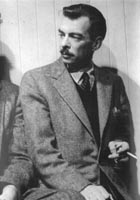Aspects Of Robinson Poem by Weldon Kees
Aspects Of Robinson
Robinson at cards at the Algonquin; a thin
Blue light comes down once more outside the blinds.
Gray men in overcoats are ghosts blown past the door.
The taxis streak the avenues with yellow, orange, and red.
This is Grand Central, Mr. Robinson.
Robinson on a roof above the Heights; the boats
Mourn like the lost. Water is slate, far down.
Through sounds of ice cubes dropped in glass, an osteopath,
Dressed for the links, describes an old Intourist tour.
—Here’s where old Gibbons jumped from, Robinson.
Robinson walking in the Park, admiring the elephant.
Robinson buying the Tribune, Robinson buying the Times. Robinson
Saying, “Hello. Yes, this is Robinson. Sunday
At five? I’d love to. Pretty well. And you?”
Robinson alone at Longchamps, staring at the wall.
Robinson afraid, drunk, sobbing Robinson
In bed with a Mrs. Morse. Robinson at home;
Decisions: Toynbee or luminol? Where the sun
Shines, Robinson in flowered trunks, eyes toward
The breakers. Where the night ends, Robinson in East Side bars.
Robinson in Glen plaid jacket, Scotch-grain shoes,
Black four-in-hand and oxford button-down,
The jeweled and silent watch that winds itself, the brief-
Case, covert topcoat, clothes for spring, all covering
His sad and usual heart, dry as a winter leaf.
A compelling portrait of the world-weary Robinson and probably of Weldon Kees himself, ' His sad and usual heart, dry as a winter leaf'. One of his best poems, I think.
Depiction of Robinson in motley moods and varied actions is simply marvelous. Thanks for sharing.10 points.
Absolutely brilliant poem. So American, so New York. The haunting loneliness of an individual in modern urban life is timelessly conveyed in this unforgettable poem.
This poem has not been translated into any other language yet.
I would like to translate this poem
One of the best. Memorable and haunting poem.